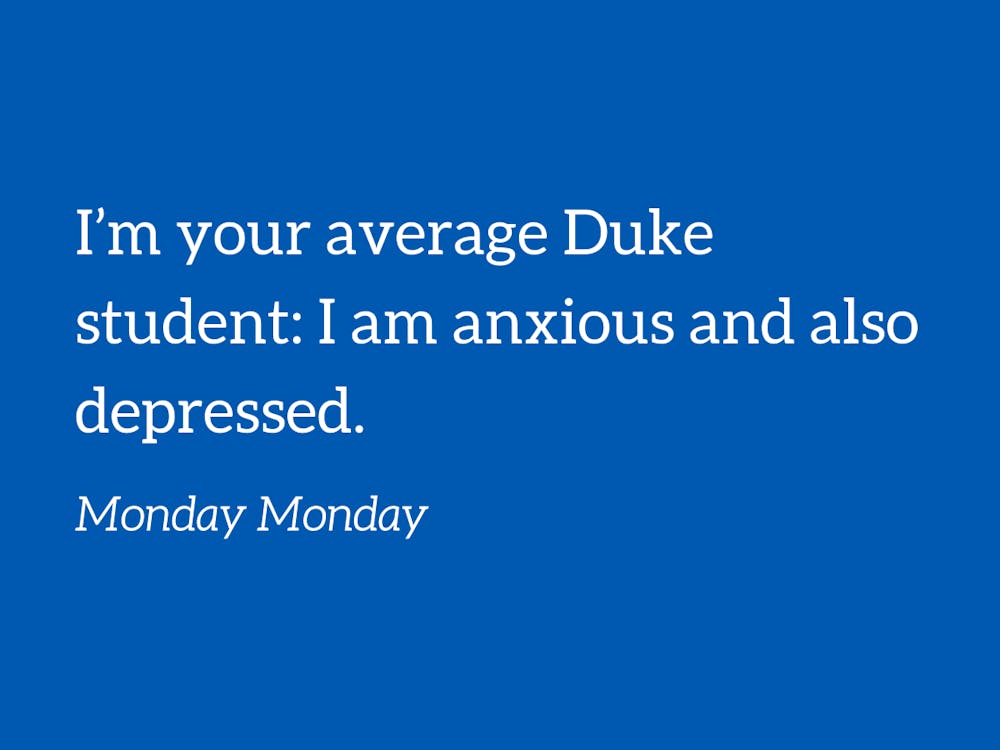I’m your average Duke student: I am anxious and also depressed.
But this weird thing has been happening this semester where I feel even more anxious and depressed than usual. Others have been experiencing this phenomenon too.
“I am really quite anxious. Depressed as well. Even more so than usual,” they say, anxiously, and with a depressed sort of tinge. Academic expectations haven’t changed at all even though we’re in the middle of a pandemic and the election is a shitshow and the world is literally on fire. Serotonin levels have dipped to record lows as midterms ravage campus.
Personally, I blame CAPS.
I mean come on! This is, like, their department. What gives? This week, I went undercover and infiltrated the counseling and psychological services office on the third floor of the Student Wellness Center in search of answers. I posed as an intern and commiserated with the various counselors and psychiatrists in the breakroom during their lunch.
“Foof. I really don’t know what to do about these poor little guys,” I say, hoping that someone will take the bait. “They’re all so sad! Geez-Louise!”
“You’re the new intern, right? Here’s a tip,” chimes in a psychiatrist. “As soon as a student says ‘depression’ or ‘anxiety’, whip out a prescription for Zoloft. I’ve got a bunch socked away in my desk drawer ready to go. Why Zoloft? It’s the most likely to cause adverse side effects for people in the age range we prescribe. It’s fun to watch ‘em squirm.”
“Yeah, yeah, yeah! They’re like little British orphans. ‘Please headmaster! Spare me brain a wee smidge of happy chemicals!’ Ahahahaha! Remember, we can’t let their serotonin reuptake or else their mental health will improve and Duke will lose its challenging and rigorous reputation. Those are orders from the tip-top!”
“These past few weeks have been like the Superbowl for us! Between the debates and midterms and everything else, students are flocking to us like never before! We’re getting more foot-traffic than Sazón!”
They paint a clear picture of their side of the story. I wanted to see what the sentiment was on the other side of the aisle:
“Friendship ended with CAPS. Now drugs are my best friend.”
This is my latest case study: an RA in the substance-free dorm on East campus. She takes a fat bong rip before continuing:
“This helps with my anxiety. I’m pre-med, so I’m good to self-medicate. Anyways, I’m a Baldwin scholar! And I’m in Cooper! How am I supposed to be able to brag to people about those things if there’s no campus full of people to brag to? It’s terrible for my mental health! Whenever I hear ‘employment’ or ‘job market’ I immediately burst into tears”
I suggest therapy to her.
“Ew, no. That’s for depressed people. Or unaffiliated people. Same difference. Besides, I’ve got no time for therapy. My classes are insane! The first line of the syllabus for one of my classes is ‘There will be great weeping and gnashing of teeth’. That was for chemistry! And I don’t even know where to start with some of these assignments. How am I supposed to do a virtual synchronous midterm for a god***n basket weaving class?’ I can only show you the basket from so many angles over zoom, Brad!”
But the plight of the virtual student is nothing compared to the plight of the virtual professor. While most faculty are used to conducting classes by giving powerpoint presentations while lecturing, they are now faced with the insurmountable, Herculean task of giving powerpoint presentations while lecturing, but, like, sorta differently. In the student-professor dichotomy, it is surely the professor whose bandwidth has been stretched the most thinly in these trying times.
I interviewed one such professor earlier this week. I asked him what he thought about student complaints regarding workload.
“Oh yeah. They’re absolutely right. I’m just a straight-up sadistic person. It’s not that deep. I love to do this thing where I switch off my mic randomly or turn off the powerpoint slides just to mess with them. I’m such a baddie! Tee-hee-hee!”
Even though the conversation has progressed significantly these past few years, even at a place like Duke, there’s a stigma surrounding mental health discourse because everyone is perceived as so high-functioning. And it doesn’t help that CAPS has a somewhat shaky reputation on diversity amongst the students who rely on its services.
So we’re paying assloads of money to be so inundated with wild, academic-goose-chases that we can’t healthily take stock of our mental wellness, and even when we do have time to take stock we aren’t comfortable talking about our struggles and even when we do talk about them we can’t 100% trust the source that we’re approaching with vulnerability to take care of us. And we’re all just cool with it. So long as we throw up some resources in italics at the end of the article. “Here’s the National Suicide Prevention Hotline! Here’s CAPS! Here’s NAMI! Here’s PASH! Here’s DukeReach! ”
We’re sure you’ll need ‘em.
Monday Monday is tired.
Get The Chronicle straight to your inbox
Signup for our weekly newsletter. Cancel at any time.

